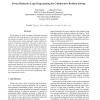Free Online Productivity Tools
i2Speak
i2Symbol
i2OCR
iTex2Img
iWeb2Print
iWeb2Shot
i2Type
iPdf2Split
iPdf2Merge
i2Bopomofo
i2Arabic
i2Style
i2Image
i2PDF
iLatex2Rtf
Sci2ools
124
click to vote
IAT
2006
IEEE
2006
IEEE
Toward Inductive Logic Programming for Collaborative Problem Solving
In this paper, we tackle learning in distributed systems and the fact that learning does not necessarily involve the participation of agents directly in the inductive process itself. Instead, many systems frequently employ multiple instances of induction separately. The paper’s main contribution is a new approach that tightly integrates processes of induction between distributed agents, based on inductive logic programming techniques, for a wider class of problem solving tasks. The approach combines inverse entailment with an epistemic approach to reasoning about knowledge, facilitating a systematic approach to the sharing of knowledge and invention of predicates only when required. We illustrate the approach for learning declarative program fragments and for a well-known path planning problem and compare results empirically to (multiple instances of) single agent-based induction over varying distributions of data. Given a chosen path planning algorithm, our algorithm enables agents...
Related Content
| Added | 11 Jun 2010 |
| Updated | 11 Jun 2010 |
| Type | Conference |
| Year | 2006 |
| Where | IAT |
| Authors | Jian Huang, Adrian R. Pearce |
Comments (0)

